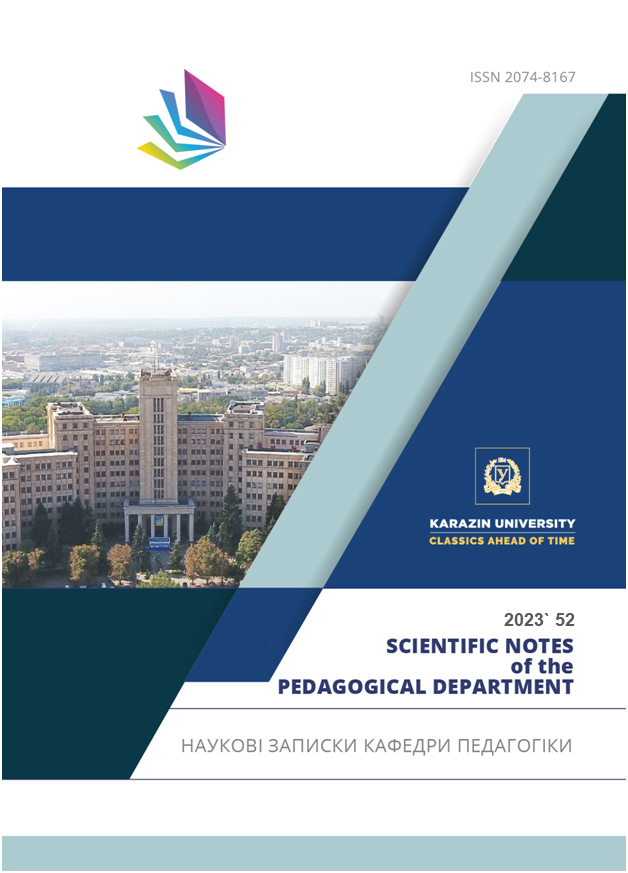Digital competence of higher medical education students in the context of today`s challenges
Abstract
The importance of digital competence for higher education students cannot be overstated. In today`s world, digital technologies are everywhere and this fact changing the way we live, work and learn. To be succesful in studies of digital technologies, students must develop the skills and knowledge necessary to use these technologies effectively. Digital competence is particularly important in higher education, where students are expected to engage in independent research, critical thinking and collaborative learning. The purpose of the article is to investigate the importance of using new methods in higher education and highlight some of the most promising methods that are currently used, to consider the importance of forming digital competence of students of higher medical education. The article reveals the essence of digital competence of students of higher medical education institutions in the context of studying language disciplines.
Downloads
References
Henseruk, H. R.(2019). Tsyfrova kompetentnist yak odna iz profesiino znachushchykh kompetentnostei maibutnikh uchyteliv. Open educational e-environment of modern University, №6, S. 8-16. [in Ukrainian].
Kovalchuk, V. I., Fedotenko, S. R. (2018). Innovatsiini tekhnolohii navchannia – osnova modernizatsii profesiinoi osvity. Molodyi vchenyi, №12,. S. 425-429. [in Ukrainian].
Pryidak, T. B., Yaloveha, L. V., Leha, O. V., Mysnyk, T. H., Zoria, S. P. (2019). Rozvytok tsyfrovoi kompetentnosti yak umova zabezpechennia konkurentnospromozhnosti maibutnikh ekonomistiv. Informatsiini tekhnolohii i zasoby navchannia, Tom 73, №5. S.28-44. [in Ukrainian].
Sukhomlyn, O. (2022). Tsyfrova kompetentnist zdobuvachiv vyshchoi filolohichnoi osvity v umovakh suchasnykh zapytiv suspilstva: tsinnisnyi aspekt. Molod i rynok. Vypusk № 2. S.170-176. [in Ukrainian].
Ala-Mutka, K., Punie, Y., Redecker, Ch. (2008). Digital Competence for Lifelong Learning. Policy Brief. Luxembourg: Ofꢁice for Ofꢁicial Publications of the European Communities, URL: https://www.researchgate. net/publication/256460657 (дата звернення: 25.04.2023).
Anderson, T. (Ed.) (2018). The Theory and Practice of Online Learning, 2nd ed.; Athabasca University Press:
Edmonton, AB, Canada.
Dumford, A.D.; Miller, A.L. (2018). Online learning in higher education: Exploring advantages and disadvantages
for engagement. J. Comput. High. Educ. 30, 452–465.
Cabero-Almenara, J., Gutiérrez-Castillo, J.J., Guillén-Gámez, F.D. et al. Correction: Digital Competence of Higher Education Students as a Predictor of Academic Success. Tech Know Learn 28, 703 (2023). https://doi. org/10.1007/s10758-022-09627-5.
GarcıáPerales, R., & Jiménez Fernández, C. Relación entre repetición de curso, rendimiento académico e igualdad en educación: Las aportaciones de PISA. Revista Educación, Polıt́ica y Sociedad, 4(1), 2019. P.84–108. 10. Henderson, M.; Selwyn, N.; Aston, R. (2017). What works and why? Student perceptions of ‘useful’ digital technology in university teaching and learning. Stud. High. Educ. 42, 1567–1579.
Marimon-Martı,́M., Romeu, T., Ojando, E. S., & González, V. E. Competencia Digital docente: Autopercepción en estudiantes de educación: [Teacher digital competence. Pixel-Bit, Revista de Medios y Educación. 2022. https:// doi.org/10.12795/pixelbit.93208.
Papert Seymour. Mindstorms: children, computers, and powerful ideas. USA, 2020. с.225. 13. Prensky, M. H. sapiens digital: from digital immigrants and digital natives to digital wisdom. Innovate Journal of Online Education, 5. 2009. p.225.
Read, T., & Kukulska-Hulme, A. (2015). The role of a mobile app for listening comprehension training in distance
learning to sustain student motivation. Journal of Universal Computer Science, 21(10), 1327–1338.
Citations
A BIBLIOMETRIC ANALYSIS OF DIGITAL COMPETENCE IN HIGHER EDUCATION
Güler Dilcan (2025) Van Yüzüncü Yıl Üniversitesi İktisadi ve İdari Bilimler Fakültesi Dergisi
Crossref

